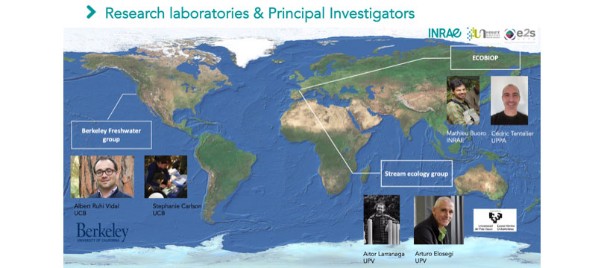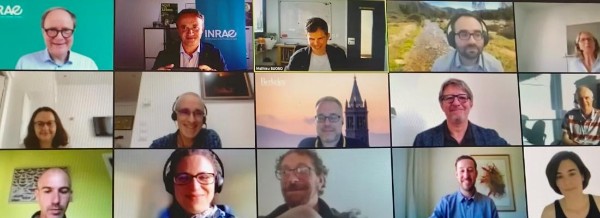UPPA participates in new international lab “MacLife” dedicated to climate impacts on freshwater ecosystemsFrance-Spain-USA
On June 10, 2021, Philippe Mauguin, President and CEO of INRAE, Noam Pines, Associate Director at the University of California at Berkeley, Laurent Bordes, President of the University of Pau and the Pays de l'Adour, and Eva Ferreira Garcia, Rector of the University of the Basque Country in Bilbao, undertook the creation of a new International Associated Laboratory (IAL) called “MacLife.”
By bringing together complementary disciplinary expertise, this new laboratory “without walls” will be dedicated to understanding the impacts of climate change on freshwater organisms and ecosystems. The joint work of the different teams should make it possible to suggest appropriate policies for the management of aquatic environments.
Combining their knowledge, skills and experimental facilities within the MacLife international laboratory, the three teams involved (UMR Ecobiop in Saint-Pée-sur-Nivelle, the Freshwater Group in Berkeley and the Aquatic Ecology Group in Bilbao) will explore the impacts of climate change at different levels of ecological organizations (from genes to ecosystems), their interactions, and over different time and space scales, in order to recommend policies and management actions that promote the stability, resilience, and adaptation of aquatic ecosystems to climate change.
The main goal of the MacLife project is to discover how ecological networks and biodiversity (at various overlapping levels of organization) promote adaptive species response and resilience of freshwater ecosystems to rapid environmental change. Particular attention will be paid to the consequences of extreme events (increased frequency of floods, droughts, etc.) on aquatic organisms, including endangered species of great heritage and fishing interest, such as migratory fish (salmon, eels, etc.), ecosystems and the services they produce in order to better anticipate risks, based on the climatic diversity of the study sites (France, California, Spain).
The project aims at transferring knowledge to a wider scientific community but also to managers in order to imagine future management strategies for natural resources, ecosystems and their associated benefits.
The creation of this International Associated Laboratory is the result of a long collaboration between the partners. The I-Site Energy Environment Solutions (E2S), supported by the University of Pau and Pays de l'Adour, is playing a major role in this collaboration by financing thesis and post-doctoral projects for the next two years, in the continuity of their historical partnership with UMR Ecobiop.

